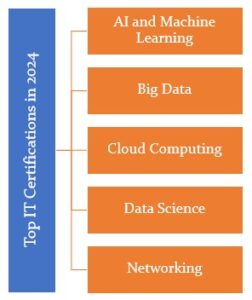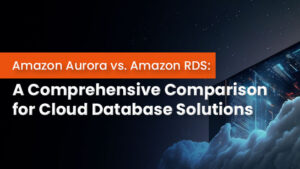Introduction
Obtaining certifications in various IT fields and skills is crucial for several reasons. Firstly, certifications lend credibility to your expertise, serving as a valuable endorsement of your skills. This external validation enhances your professional portfolio and establishes you as an expert. Secondly, certifications significantly boost your marketability by providing a competitive edge during hiring. For example, certifications from various platforms include practical components, such as lab work and hands-on projects, showcasing your readiness for real-world tasks. This distinguishes you from others with only basic college degrees. Lastly, staying certified is essential in the rapidly evolving technology landscape, ensuring that you stay abreast of new developments and remain a valuable asset to employers in the long run.
Dive deeper into the world of cloud technology and IT mastery with IPSpecialist! Get the best course by accessing comprehensive IT certification training and resources. From beginner-level IT courses to mastering Microsoft, AWS, Cisco, and more, IPSpecialist offers diverse courses, study guides, and practice exams tailored to amplify your skills. Elevate your career in the dynamic realm of IT—explore their offerings now!
Top IT Certifications

-
Artificial Intelligence and Machine Learning Courses
AI and Machine Learning are the hottest buzzword in tech today, and all the major enterprises are using it to improve business. From voice assistants to drones, AI and Machine Learning are increasingly finding applications in our day-to-day lives, creating jobs across sectors and giving rise to new career paths.
- Target Audience: The Artificial Intelligence and Machine Learning certification is designed for professionals creating AI and ML-based solutions. It is suitable for those already working in data science, software engineering, AI development, or information technology, aiming to deepen their knowledge in these areas.
- Top Companies and Industries: AI and machine learning experts are in demand across various sectors, including banking, healthcare, manufacturing, and retail.
- Career Path: Professionals can start as Data Scientists, Machine Learning Engineers, or AI Developers, progressing to higher-level roles like Chief Data Scientists, AI Architects, or Directors of AI in artificial intelligence and machine learning.
- Demand: Jobs related to AI and machine learning have seen a 75% increase over the past four years and are anticipated to continue growing.
- Eligibility Requirements: A bachelor’s degree in computer science, mathematics, or a related discipline is often required for admission to AI and machine learning certification programs. Some programs may prefer applicants with working knowledge of programming languages and statistical analysis.
- Roles and Responsibilities include creating and training machine learning models, verifying data sets, and implementing AI solutions. Professionals in this field should excel in coding, deeply understand statistics, and effectively communicate their ideas to colleagues and clients.
The best IT certifications that can help you kickstart a career or move up in your AI and Machine Learning career are:
- AI and ML Course
- Artificial Intelligence Course
- AI and Machine Learning Course
- Master in Artificial Intelligence
- AI Program for Business
-
Big Data Courses
Big Data is not a technology but a practice that helps analyze massive amounts of data to gain insights and improve decision-making. As the sheer volume of data increases daily, professionals skilled in Big Data are highly in demand.
- Target Audience: Big Data certification is ideal for professionals aiming to enhance skills in handling, processing, analyzing, and visualizing massive information. This includes roles such as data analysts, data scientists, database administrators, and IT specialists.
- Top Companies and Industries: Big Data experts are sought after in diverse sectors, including healthcare, banking, e-commerce, and social media.
- Career Path: Professionals can start in entry-level positions like Data Analyst or Data Engineer and progress to more senior roles such as Big Data Architect, Director of Data Science, or Chief Data Officer. Career trajectories depend on work experience, education level, and industry.
- Demand: The demand for individuals with Big Data expertise is high as companies leverage big data to maintain a competitive edge in the market.
- Eligibility Requirements: Typically, a bachelor’s degree or higher in relevant subjects like computer science, mathematics, or statistics is required for Big Data certification programs. Some programs may require field experience, and knowledge of programming languages like Python, R, and SQL is often necessary.
- Roles and Responsibilities: Big Data specialists are responsible for building and executing Big Data solutions, monitoring and analyzing large volumes of data, creating predictive models and algorithms, and presenting findings to stakeholders. Key attributes include collaboration, analytical skills, and problem-solving abilities.
The top IT certifications that can help you land a job in the thriving field of Big Data include:
- Big Data Engineer Master’s Program
- Big Data Hadoop Administrator
- Big Data Hadoop and Spark
-
Cloud Computing Courses
Cloud computing revolutionizes computing by providing on-demand access to various services, including storage and processing power, over the internet. It offers scalability, flexibility, and cost-effectiveness, allowing users to quickly adjust resources based on demand. This model, encompassing IaaS, PaaS, and SaaS, eliminates the need for extensive upfront hardware investments, enabling individuals and organizations to focus on their core activities while outsourcing infrastructure management to cloud service providers.
- Target Audience: Professionals interested in cloud computing applications, including software developers, system administrators, and business analysts.
- Industries Hiring: Amazon, Microsoft, Oracle, Accenture, Wipro, Tata Consultancy Services, HCLTech, and IBM across various industries.
- Career Path: Begins with entry-level roles like cloud support engineer or administrator, progressing to higher-level positions such as Cloud Solutions Architect, Cloud Security Engineer, or Cloud Operations Manager with experience.
- Demand: High demand for Cloud Computing professionals, with the global public cloud services market projected to reach $600 billion by 2024 (Gartner).
- Eligibility Requirements: Vary by course, but generally, applicants should be familiar with computer networking and operating systems.
- Roles and Responsibilities: Design and implement cloud solutions, maintain infrastructure, ensure security and compliance, and optimize cloud performance based on specific job descriptions.
These top IT certifications can help you launch or advance a career in cloud computing:
- AWS Certified Solution Architect
- AWS Developer Associate Certification
- Microsoft Azure Certification
- Google Cloud Digital Leader
-
Data Science Courses
Data Science has taken the world by storm and is one of the most in-demand career choices today. Opportunities in the field are endless, and job roles in Data Science promise high-paying salaries.
- Target Audience: Obtaining a Data Science certification is a valuable move for those keen on mastering data-driven decision-making, attracting individuals from diverse fields like computer science, data analysis, business management, and data science enthusiasts.
- Top Companies and Industries Hiring: Data scientist roles span diverse sectors, including banking, finance, insurance, media, healthcare, retail, telecommunications, and automotive.
- Career Path: Data scientists pursue diverse careers in various fields, with roles ranging from Data Analyst to Chief Data Officer. These positions represent just a few possible milestones for becoming an industry leader in leveraging data.
- Demand: The Bureau of Labor Statistics (BLS) projects a 27.9% growth in data scientist employment by 2026, with the market estimated to reach USD 322.9 billion. The increasing reliance of businesses on data for crucial decisions is anticipated to drive the continued demand for data scientists.
- Eligibility Requirements: Data Science certification courses allow participants of all experience levels, from beginners to experts, with the sole prerequisite being an undergraduate degree. No prior coding background is necessary for enrollment in full- or part-time courses.
- Roles and Responsibilities: Data Scientists collect, clean, and analyze structured and unstructured data, utilizing analytics tools to foster data-driven decision-making. They undertake tasks such as wrangling and segmenting and sometimes design and implement machine learning models.
Certifications that can help you move into the data science domain include:
- Data Scientist Master’s Program
- Business Analytics Expert
- Data Science with R Programming
- Data Analyst Master’s Program
-
Networking Courses
Networking Courses comprehensively explore the principles and practices essential for creating and maintaining effective communication and connectivity in the digital landscape. Traditionally, companies relied on isolated computer systems, but the emergence of networking has revolutionized the way information is shared across diverse devices. These courses cater to professionals interested in networking roles, including network engineers, system administrators, and IT specialists.
- Target Audience: Networking courses cater to a broad audience, including network engineers, system administrators, IT specialists, technical support professionals, information security experts, telecommunications professionals, software developers, business analysts, recent graduates, students, and career changers.
- Industries Hiring: Proficient network administrators are in demand across diverse sectors, including the IT industry, telecommunications, public and private sectors, and healthcare.
- Career Path: After completing a certification course in networking, individuals can pursue various career options. These include roles such as Network Engineer, Network Administrator, Network Security Expert, Network Analyst, or Network Architect.
- Demand: High demand for networking professionals will persist as technology reliance increases. Skilled professionals are needed to manage and secure complex networks.
- Eligibility Requirements: Prerequisites for networking certification courses vary based on course and certification level. Generally, applicants need a basic understanding of networking and some IT experience.
- Roles and Responsibilities: Network administrators have diverse tasks, including designing and implementing network architecture, configuring devices, troubleshooting issues, and ensuring network security. Collaboration with IT specialists and stakeholder communication is essential for meeting network requirements.
Acquiring certifications such as:
- Cisco Certified Network Associate (CCNA)
- CompTIA Network+
- Juniper Networks Certified Internet Specialist (JNCIS)
- Cisco Certified Network Professional (CCNP)
Conclusion
In the fast-paced realm of information technology, staying relevant and competitive requires continuous learning and skill enhancement. Certifications are pivotal in validating expertise, enhancing marketability, and keeping professionals abreast of technological advancements. The blog emphasizes the significance of certifications in the IT field. It highlights five essential courses IPSpecialist offers, covering critical areas such as Data Science, Big Data, Artificial Intelligence and Machine Learning, Cloud Computing, and Project Management. These courses cater to a diverse audience, providing a pathway for professionals to upskill and advance their careers in the dynamic world of IT.
FAQs
-
Why certifications are necessary in the IT industry?
Answer:
Certifications in the IT industry are crucial for several reasons. They lend credibility to one’s expertise, enhance marketability, and provide a competitive edge during hiring. Additionally, certifications ensure that professionals stay updated on new developments in the rapidly evolving technology landscape.
-
What are the eligibility requirements for Big Data certification programs?
Answer:
Big Data certification programs typically require a bachelor’s degree in relevant subjects like computer science, mathematics, or statistics. Some programs may also require field experience, and knowledge of programming languages like Python, R, and SQL is often necessary.
-
What is the demand for professionals with AI and machine learning expertise?
Answer:
Jobs related to AI and machine learning have seen a 75% increase over the past four years and are anticipated to continue growing. Major companies across various sectors, including Google, Amazon, and Microsoft, actively seek professionals with AI and machine learning skills, creating a high demand for expertise in these areas.








